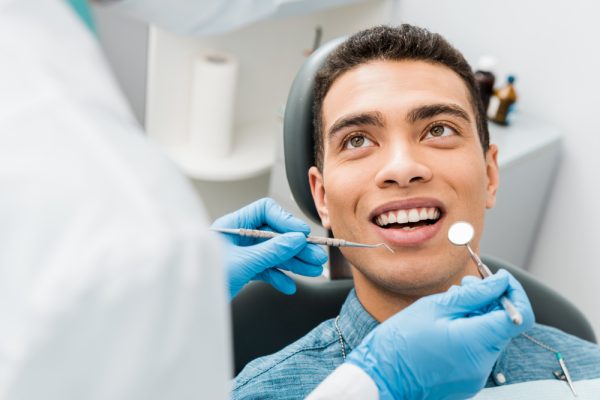Overcome Your Fear of the Dentist with Dr. Kevin H. Gropp
Dental anxiety is a common issue for many adults. Whether it’s a fear of pain, a bad previous experience, or simply the idea of sitting in a dental chair, these feelings can keep you from seeking the care you need to maintain a healthy smile. Dental anxiety affects individuals in various significant ways, including physiological, cognitive, and behavioral impacts. Fortunately, there are numerous ways to manage dental anxiety, and Kevin H. Gropp, DDS is dedicated to making your visits as comfortable and stress-free as possible.
In this blog, we’ll discuss practical tips and strategies for overcoming dental anxiety, ensuring that you receive the dental care you deserve while feeling relaxed and at ease. Anxiety can make people dread going to the dentist, but addressing these fears is crucial for proper oral health. To learn more about our services, contact our Northridge dental office at (818) 709-8645.
Understand the Source of Your Dental Anxiety
Before you can effectively manage dental anxiety, it’s helpful to understand what’s causing it. Some common reasons people experience dental fear include:
- Fear of Pain: Concerns about discomfort or pain during dental procedures.
- Embarrassment: Feeling self-conscious about the condition of your teeth.
- Past Negative Experiences: Previous dental visits that were traumatic or uncomfortable.
- Fear of the Unknown: Not knowing what to expect during a treatment or procedure.
In some cases, dental anxiety can escalate to an anxiety disorder, leading to severe phobia and intense fear when facing dental appointments or treatments.
Identifying the specific cause of your anxiety is the first step in addressing it. Once you understand the root of your fear, you can take targeted actions to alleviate it.
What is Dental Anxiety?
Dental anxiety is a feeling of unease or fear about dental visits. In severe cases, this anxiety can develop into dental phobia, a condition that can hinder individuals from seeking necessary dental care. Dental phobia often stems from past traumatic experiences, fear of pain, and other psychological triggers. Effective communication between patients and dental professionals is crucial in managing and overcoming these anxieties.
What is Dental Anxiety?
Dental anxiety is a common condition that affects many people, causing feelings of unease, apprehension, stress, and fear when visiting the dentist or even thinking about dental treatment. This anxiety can range from mild nervousness to severe phobia, and it can be triggered by various factors such as past traumatic experiences, fear of pain, or fear of the unknown. Unfortunately, dental anxiety often leads to the avoidance of dental appointments, which can result in poor oral health and more complex dental problems down the line. Understanding and addressing dental anxiety is crucial for maintaining a healthy smile and overall well-being.
Signs and Symptoms of Dental Anxiety
Recognizing the signs and symptoms of dental anxiety is the first step toward managing it. While the experience can vary from person to person, common indicators include:
- Rapid heartbeat and palpitations
- Sweating and trembling
- Avoidance of dental appointments or delaying treatment
- Fear of the dental chair or dental instruments
- Difficulty breathing or feeling of choking
- Nausea or vomiting
- Dizziness or lightheadedness
- Feeling of panic or anxiety when thinking about dental treatment
If you notice any of these symptoms, it’s important to communicate them with your dentist. Acknowledging your anxiety can help you and your dental team develop strategies to make your visits more comfortable.
Causes of Dental Anxiety
Human Biology and Past Experiences
The human body is naturally wired to respond to potential threats, and the mouth is a particularly sensitive area. This biological response can contribute to dental anxiety, especially when it comes to the anticipation of pain or discomfort. Additionally, past experiences play a significant role. If you’ve had a painful or traumatic dental experience in the past, it’s understandable that you might associate dental treatment with fear and anxiety. Recognizing these triggers can help you and your dentist create a plan to manage your anxiety effectively.
Negative Dental Stereotypes
Negative stereotypes about dentists, often perpetuated by media and popular culture, can also contribute to dental anxiety. Movies and TV shows sometimes portray dentists as scary or uncaring, which can create unrealistic expectations and reinforce fears. The sight and sound of dental instruments can be intimidating, especially if you’re not familiar with them. It’s important to address these misconceptions and work with a dentist who understands your concerns. By doing so, you can overcome your fears and receive the necessary dental care to maintain good oral health.
By following this structured approach, the new sections are seamlessly integrated into the existing article, providing comprehensive information while maintaining a supportive and reassuring tone.
Communication Is Key
One of the most effective ways to ease dental anxiety is open communication. Don’t be afraid to talk to Dr. Gropp or his team about your concerns. Dental anxiety is recognized as part of mental disorders, and addressing these issues with your dental team is crucial for improving patient outcomes. Whether it’s the fear of a specific procedure or just the general feeling of anxiety before a visit, sharing your feelings with the dental team allows them to adjust the approach to your care.
Here’s how to communicate effectively with our Northridge dentist:
- Be Honest: Let Dr. Gropp know about any fears or past experiences that have made you anxious.
- Ask Questions: Don’t hesitate to ask about the procedure, including what you’ll experience, how long it will take, and how discomfort will be managed.
- Establish a Signal: If you’re nervous about a procedure, establish a hand signal or word with your dental team to indicate when you need a break. This gives you more control over the situation.
Use Relaxation Techniques
Relaxation techniques can help calm your mind and body before and during your dental appointment. Here are a few methods that may help you feel more at ease:
- Deep Breathing: Practice deep, slow breaths to reduce anxiety. Focus on inhaling for a count of four, holding for four, and exhaling for four. This can help activate your body’s relaxation response.
- Visualization: Imagine yourself in a calm, peaceful place. Whether it’s the beach, a quiet forest, or a cozy room, visualizing a calming scene can help you relax.
- Progressive Muscle Relaxation: Tense and then relax each muscle group in your body. Start with your toes and work your way up to your head. This can help release physical tension and promote relaxation.
Relaxation techniques can also be effective in managing anxiety disorders, including those related to dental anxiety.
Consider Sedation Dentistry
For patients with severe dental anxiety, sedation dentistry may be a helpful option. Conscious sedation, which includes techniques like nitrous oxide, helps manage anxiety and discomfort during dental procedures. It allows you to relax while maintaining awareness and communication, ensuring safety and proper evaluation of individual patient needs.
There are several types of sedation that Dr. Gropp may recommend, depending on your level of anxiety and the procedure you’re having done:
- Nitrous Oxide (Laughing Gas): This mild sedative helps you feel relaxed and at ease during the procedure. It wears off quickly, allowing you to resume your normal activities after the visit.
- Oral Sedation: For moderate anxiety, oral sedation can help you feel calm throughout the procedure. You’ll remain awake but relaxed.
- IV Sedation: This option is for those with more severe anxiety and can help you feel completely relaxed or even sleepy during treatment.
Dr. Gropp will discuss your sedation options during your consultation to find the best choice for your needs.
Bring a Supportive Friend or Family Member
Having someone you trust with you during your dental visit can be incredibly comforting. Whether it’s a spouse, friend, or family member, having a support person by your side can help reduce feelings of anxiety and make the experience feel more manageable. Just knowing that someone you care about is there can provide significant reassurance.
Listen to Music or Bring Distractions
Sometimes, focusing on something other than the dental procedure can be helpful in easing anxiety. Bring a pair of headphones and listen to soothing music, an audiobook, or even a podcast. By focusing on something enjoyable, you can take your mind off the procedure and feel more relaxed.
Many dental offices have TVs in the treatment rooms and some even offer noise-canceling headphones. You may also be able to bring your own distractions, such as a stress ball or a small toy to occupy your hands.
Establish a Positive Routine
If dental anxiety has been an ongoing issue for you, establishing a routine of regular visits to the dentist can help reduce fear over time. For anxious patients, this routine can be particularly beneficial as it helps them feel more comfortable and at ease. Routine visits to Dr. Gropp’s office will allow you to become more familiar with the environment, the dental team, and the process, which can help make future visits feel less intimidating. Regular dental checkups can also help catch problems early, meaning less invasive and more manageable treatments.
Use Technology to Your Advantage
Advancements in dental technology can help make your visits more comfortable and less stressful. Dr. Kevin Gropp uses the latest techniques and tools to ensure that your treatments are as efficient and painless as possible. Laser dentistry, for example, reduces the need for traditional drills, which can be loud and cause anxiety in some patients.
Dr. Kevin Gropp Prioritizes Your Comfort and Dental Care
Dr. Kevin Gropp and his team are committed to providing a compassionate and supportive environment for patients with dental anxiety. Creating a supportive environment within the dental practice helps manage dental anxiety, allowing patients to receive the care they need. With a gentle, understanding approach and modern dental techniques, we work with you to ensure that your dental visits are as stress-free as possible.
Take the First Step Toward a Comfortable Visit
If dental anxiety is preventing you from getting the care you need, we’re here to help. Dr. Gropp’s office offers a range of options to make your dental visits more comfortable. From sedation options to relaxation techniques, we’re here to help you feel at ease. Dental anxiety can escalate to a recognized phobia categorized in the Diagnostic and Statistical Manual of Mental Disorders, making it important to understand and address these fears.
To learn more about how we can help manage your dental anxiety or to schedule your next appointment, call our Northridge dentist at (818) 709-8645. Don’t let fear keep you from achieving optimal oral health. Let us help you smile with confidence!



